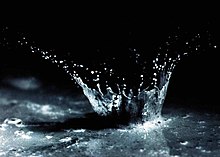
Petrichor
Petrichor (/ˈpɛtrɪˌkɔːr/) is the earthy scent produced when rain falls on dry soil. The word is constructed from Ancient Greek πέτρα (pétra) 'rock', or πέτρος (pétros) 'stone', and ἰχώρ (ikhṓr), the ethereal fluid that is the blood of the gods in Greek mythology.
Origins
Long before this phenomenon received its name in 1964, it had been noticed and discussed in scientific circles.
On 17 April 1891, a brief note on the phenomenon, by Thomas Lambe Phipson (1833–1908), appeared in The Chemical News—it was re-published in its entirety, a month later, in The Scientific American—in which he wrote, "This subject, with which I was occupied more than twenty-five years ago, appears from a paragraph in a late number of the Chemical News to have recently attracted the attention of Professor Berthelot and [Monsieur G.] Andre."
Phipson was referring to a short paper read by Berthelot and André at the meeting of the French Académie des Sciences on 23 April 1891, and printed in Volume 112 (1891) of Comptes Rendus, entitled "Sur l'Odeur propre de la Terre" ("On the earth's own smell").
Phipson continues, "I find, on referring to my old notes, which are dated 1865, that it is doubtful whether I ever published the results of these observations; and as the distinguished chemists I have just named have not quite solved the problem, I hasten to give the results I obtained so long ago." He then theorizes that the odour "... was due to the presence of organic substances closely related to the essential oils of plants ..." and that these substances consist of "... the fragrance emitted by thousands of flowers ..." absorbed into the pores of the soil, and only released when displaced by rain. After attempts to isolate it, he found that it "... appeared to be very similar to, if not identical with, bromo-cedren derived from essence of cedar."
The phenomenon was first scientifically described in a March 1964 paper by Australian researchers Isabel Bear and Dick Thomas, published in the journal Nature. Thomas coined the term "petrichor" to refer to what had previously been known as "argillaceous odour". In the article, the authors describe how the smell derives from an oil exuded by certain plants during dry periods, whereupon it is absorbed by clay-based soils and rocks. During rain, the oil is released into the air along with another compound, geosmin, a metabolic by-product of certain actinobacteria, such as Streptomyces, which is emitted by wet soil, producing the distinctive scent; ozone may also be present if there is lightning. In a follow-up paper, Bear and Thomas (1965) showed that the oil slows seed germination and early plant growth.
Mechanism
When a raindrop lands on a porous surface, air from the pores forms small bubbles, which float to the surface and release aerosols. Such aerosols carry the scent, as well as bacteria and viruses from the soil. Raindrops that move at a slower rate tend to produce more aerosols; this serves as an explanation for why petrichor is more common after light rains. Members of the Actinomycetes, gram-positive bacteria, are responsible for producing these aerosols.
The human nose is sensitive to geosmin and is able to detect it at concentrations as low as 0.4 parts per billion. Some scientists believe that humans appreciate the rain scent because ancestors may have relied on rainy weather for survival.Camels in the desert also rely on petrichor to locate sources of water such as oases.
See also
- Dimethyl sulfide – One of the molecules responsible for the odour of the sea
- Mitti attar – a perfume that recreates the loamy smell of a first rain
- Geosmin – Chemical compound responsible for the characteristic odour of earth
Citations
- Bear, I.J. & Thomas, R.G. (September 1966), "Genesis of Petrichor", Geochimica et Cosmochimica Acta, Vol. 30, No. 9, pp. 869–879.
External links
- "Petrichor" at A Word a Day
- From the Oxford English Dictionary
- Hansen, Joe (2014-08-18), Where does the smell of rain come from? (3-min YouTube video), It's Okay To Be Smart, PBS Digital Studios, archived from the original on 2021-12-12, retrieved 2018-01-04
- Adams, Cecil (2011-11-18), "What's that smell right before it rains?", The Straight Dope, Sun-Times Media Group, retrieved 2018-01-04
- Petrichor, U. K. Met office.
- Why is the Smell After it Rains So Appealing? The Petrichor phenomenon
- Petrichor – Why we Love the Smell of Rain
